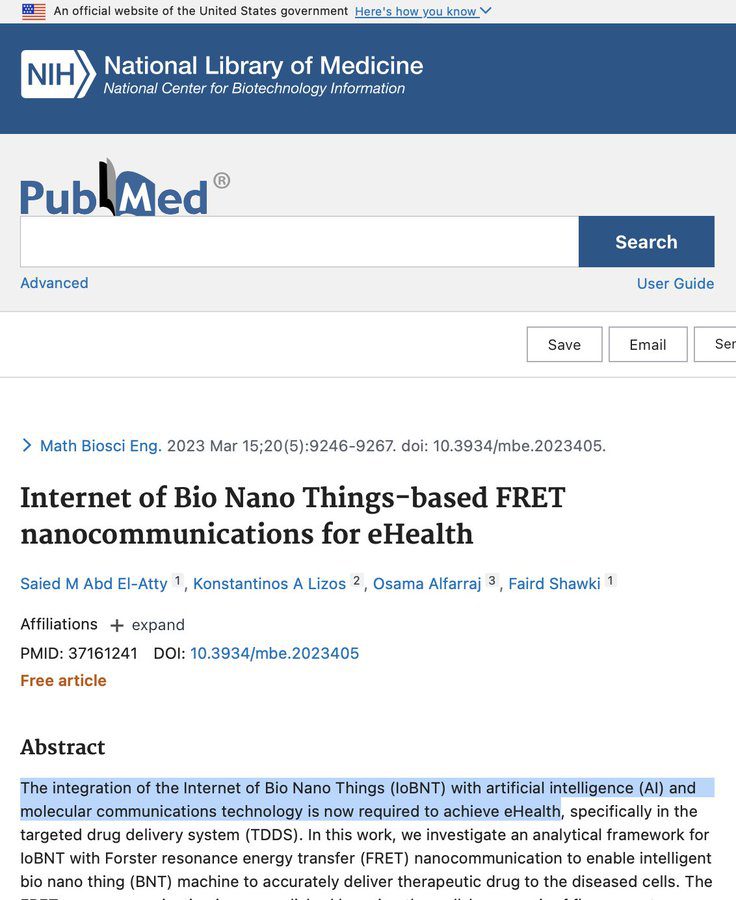The Role of AI in Revolutionizing Healthcare
Artificial Intelligence (AI) is transforming healthcare by improving efficiency, reducing delays, and enabling research. As highlighted by the Delhi AIIMS director, AI’s potential to simplify health communication, empower patients, and ensure accessibility is immense. AIIMS, Delhi is investing over Rs 300 crore in digital infrastructure to ensure that every stakeholder benefits. Experts emphasize the need for balancing technology with human empathy for compassionate, patient-centered care.Related Articles
- Model-based design AI accelerate medical innovation
- Model-based design AI accelerate medical innovation
- AI tools in healthcare industry
- AI tools in healthcare industry
- Revolutionizing synthetic biology with AI insights from Raktim Mitra and Remo Rohs
Integration of IoBNT with AI and Molecular Communications
The integration of the Internet of Bio Nano Things (IoBNT) with artificial intelligence (AI) and molecular communications technology is now required to achieve eHealth. This integration aims to enhance the monitoring and treatment of patients by leveraging the capabilities of IoBNT, which involves the use of nanoscale devices to interact with biological systems at the molecular level. The combination of these technologies can lead to more precise and personalized healthcare solutions.Advancements in Brain-Computer Interfaces
Neuralink, a company founded by Elon Musk, has made significant advancements in brain-computer interface (BCI) technology. A paralyzed man was recently fitted with a brain chip developed by Neuralink, allowing him to play online chess. This breakthrough highlights the potential of BCIs in assisting individuals with disabilities and improving their quality of life. The integration of AI in BCIs can further enhance their capabilities, making them more efficient and user-friendly.The Impact of Generative AI on Healthcare
Generative AI is poised to become a major game changer in various sectors, including healthcare. NTT’s Innovative Optical and Wireless Network (IOWN) platform uses light to transfer data, achieving ultra-low latency. This technology has the potential to revolutionize medical applications such as cloud endoscopy. As AI becomes increasingly integrated into our lives, its impact on healthcare will be profound, enabling more accurate diagnostics and personalized treatments.Addressing Biosecurity Threats with AI
The rapid development of AI also poses potential threats, such as enabling the creation of bioweapons. The US government has expressed concerns about the misuse of AI in synthetic biology, highlighting the need for robust infrastructure and risk identification tools to address these concerns. Increased regulation in AI and synthetic biology may be necessary to mitigate these risks and ensure the safe development and deployment of these technologies. AI’s potential misuse in creating bioweapons poses a significant threat to global health.Enhancing Medical Education with AI
IIIT Hyderabad has launched a 12-week online course on ‘AI for Medical Professionals’ in collaboration with NAMS and IHub-Data. This course aims to equip medical professionals with the skills to understand and apply AI technologies in clinical settings. The course includes video lectures, weekly sessions, case studies, quizzes, and assessments, leading to certification upon completion. This initiative is expected to enhance the understanding and application of AI among medical professionals, improving patient care and operational efficiency. AI in medical education is crucial for preparing healthcare professionals for the future.Looking for Travel Inspiration? Explore Textify’s AI membership Need a Chart? Explore the world’s largest Charts database
